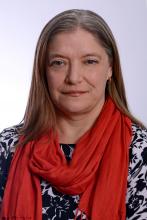MHC COVID-19 Records Available for Research
Medical Heritage Center Archivist
For many decades major episodes in United States history were accompanied by newspaper headlines and magazine articles proclaiming the events of the day. Cards, letters and telegrams were sent to share news with friends and family as situations unfolded. People recorded their memories, observations and feelings in diaries and journals for posterity. Photographs were developed as physical prints. Motion pictures or videos were shot on film or videotape. These paper-based publications, correspondence, records and audiovisual materials were often saved and some quantity collected by or donated to archives and libraries to keep safe for future generations.
As the COVID-19 virus began spreading around the globe in 2020, The Ohio State University Health Sciences Library’s Medical Heritage Center (MHC) staff saw the need to document events as they happened. Rather than papers and physical media, many records of this pandemic were born digital files disseminated through email, online news sources and social media. The MHC did not wait for people to offer donations. They started to save emails, newsletters, policy documents and press releases that recorded how Ohio State and the Wexner Medical Center changed operating procedures to limit spread of the virus, continue education and treat patients. This material now comprises The Medical Heritage Center’s Ohio State University COVID-19 Records.
MHC staff recognized that individual people and communities had different day-to-day activities during the pandemic and wanted to record these varied experiences. Staff also saw that people were seeking ways to connect with one another. They asked people and groups to send essays, photographs, poems and artwork that recorded their thoughts, feelings and how their lives changed. These submissions currently make up the Medical Heritage Center’s COVID-19 Community Collection. This collection also includes a survey of over 700 anonymous individuals collected by MHC staff. Respondents included those who were part of the Ohio State community as well as people unaffiliated with Ohio State. They were asked basic questions about themselves and open-ended questions about their unique experience of the pandemic, including what happened at work and school.
The MHC’s COVID-19 Project Collection was created with a different purpose and scope. In Delaware, Ohio, local photographer Kelsey Allen recorded events specifically as they unfolded in her town. In the spring months of 2020, many businesses and organizations closed or operated at limited capacity. She captured images of local parks, the downtown, the YMCA, a local restaurant and a church distributing food through an outdoor drive through. Since schools shifted to online instruction and numerous jobs to remote work, families found themselves at home together. Allen documented this with a series of ‘Front Porch Portraits’ that depict Delaware residents gathered on their porches.
Another effort to document the human experience of the COVID-19 pandemic is The Ohio State University College of Medicine’s Voices in Humanism Collection. It began in April 2020 as a collaboration between the Medical Heritage Center and the resident chapter of the Gold Humanism Honor Society. Voices collected visual artwork and writing created by members of the Ohio State health care community. They also strove to document and disseminate virtual performances of the Professional School Orchestra. Artistic expression tells the story of the COVID-19 pandemic as everyone worked to understand the impacts on patients, their families, and medical providers. This was a continuation of the work of the Humanism in Medicine organization founded by Dr. Linda Stone. MHC curator Kristin Rodgers shared many of these submissions through the MHC’s Historical Reflections blog and they were published in Voicesmagazine. Copies of Voices are available through the MHC.
Two COVID-19 pandemic related collections that include physical materials are the Medical Student Portrait Collection and the COVID-19 Mask Collection. The Portrait Collection is a series of medical students captured by artists and fellow medical students Elizabeth Auckley and Phillip Anjum during the pandemic. They wanted to show their classmates being themselves. Anjum printed his photographs in black and white on canvas; then Auckley thinned oil paint so that it was semi-translucent and painted color back into the photographs. The portraits were in the exhibition Medical Students in the Wild displayed at the Urban Arts Space in Columbus, Ohio, in 2022.
The mask collection contains child and adult size masks donated by different people, including home sewn masks and masks purchased at popular retail stores. There is also an unopened package of white cloth masks that the Health Sciences Library received from the U.S. Department of Health and Human Services. The label on the package states, “Do Your Part: Help Stop the Spread” and provides information about how proper use of masks could help limit the spread of the COVID-19 virus.
As the years of the COVID-19 pandemic are farther behind us, our memories of events will fade and stories we tell about what happened may begin to change. As this naturally occurs, records of the years 2020 – 2022 will be increasingly important. During COVID-19, historians were asked questions about the world-wide influenza pandemic that occurred in 1918. Journalists, public health agencies, medical providers and people making decisions about how to operate businesses and organizations looked for guidance from the past to manage the present. In the event of future pandemics, the records the MHC and other archives and libraries have saved to document COVID-19 will hopefully guide others.
Finding aids for the Medical Heritage Center’s COVID-19 collections and other archival materials can be found in the University Libraries Special Collections Registry. If you have questions or would like to make an appointment to use MHC collections, please contact curator Kristin Rodgers at MHCmail@osumc.edu.
